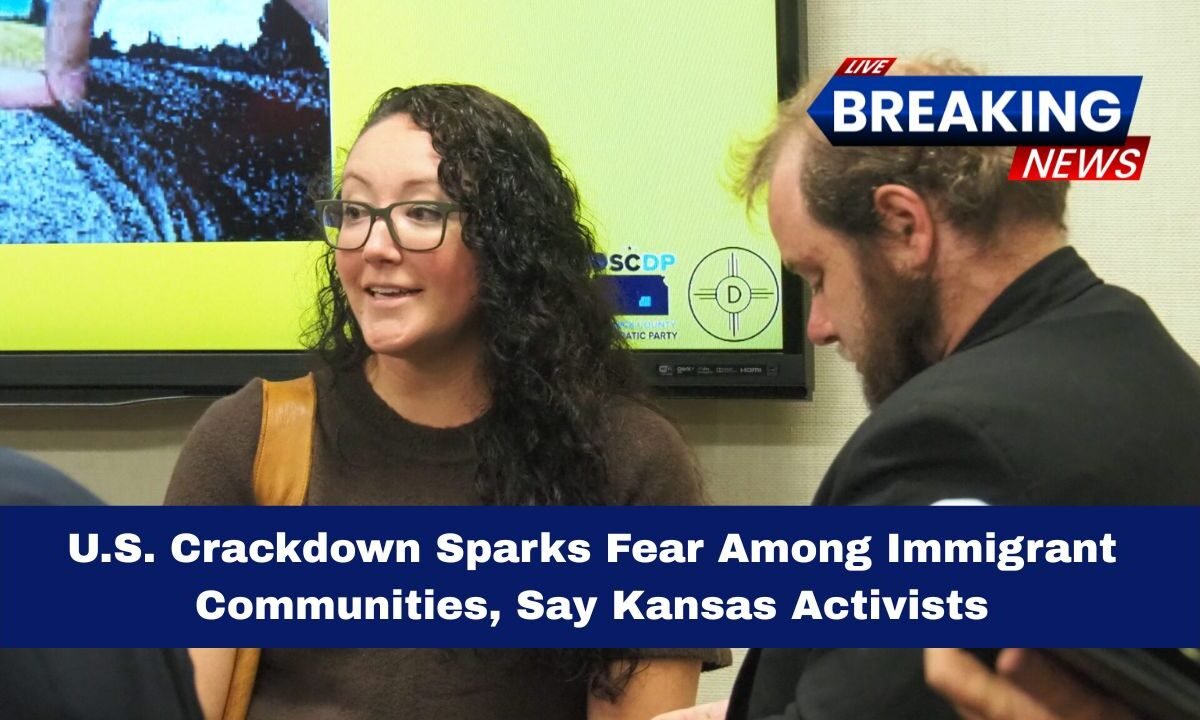Immigrant advocates across Kansas say a stepped-up federal immigration crackdown is reshaping daily life — discouraging families from going to work, school, church, or even buying groceries.
At a recent Wichita gathering, community leaders described how arrests, deportations and family separations have intensified anxiety not only for undocumented residents but also for green-card holders and naturalized U.S. citizens who worry their activism could be targeted.
What’s driving the fear
Kansas organizers point to two overlapping realities. First, enforcement numbers and tactics have escalated: federal officials are touting lower border crossings alongside aggressive interior enforcement that includes deportations and “voluntary departures.”
Second, new programs and incentives are rapidly expanding cooperation between federal agents and local police through 287(g) task-force agreements, raising civil-rights concerns for mixed-status neighborhoods in Wichita, Kansas City, and smaller Kansas towns.
Key 2025 figures Kansans are watching
- In FY 2025, Border Patrol reported 238,000 apprehensions, far below the multimillion totals seen a few years earlier—but paired with tougher interior actions that communities feel locally.
- By September, the administration said 400,000 people had been deported and about 1.6 million had left voluntarily, deepening the sense that families can be separated with little warning.
- ICE’s 287(g) expansion added 8,501 local and state officers to enforcement roles (with thousands more in training) and introduced cash reimbursements and bonuses to encourage participation.
At a glance- 2025 enforcement & Kansas context
| Item (2025) | Latest detail |
|---|---|
| Border Patrol apprehensions | 238,000 people apprehended |
| Interior removals | 400,000 deportations |
| Voluntary departures | ~1.6 million |
| 287(g) local officers added | 8,501 officers; ~2,000 in training |
| Local incentives | Salary & benefits fully reimbursed, overtime up to 25%; up to $1,000 per officer per quarter bonuses; equipment & vehicle grants available |
| Kansas civic snapshot | 116,000 Kansans have at least one immigrant parent; 74,000 are eligible voters |
How it lands in Kansas neighborhoods
In Wichita, immigrant-led groups report that routine activities — school drop-offs, clinic visits, even reporting crimes — now feel risky.
Advocates warn that public confusion about who is “lawfully present” fuels profiling and false accusations against neighbors who may be on temporary visas, DACA, or permanent residency.
Attorneys are urging calm, education, and “know your rights” planning so families aren’t blindsided during workplace or street-level encounters.
Across the Kansas City metro, hundreds to about a thousand people rallied this summer to protest raids in solidarity with West Coast demonstrations, reflecting how national sweeps ripple into the Midwest’s historically Latino corridors like the West Side and Southwest Boulevard.
Protest leaders say the message is simple: immigrants are part of the local economy and culture, and sudden removals traumatize children and destabilize businesses.
Meanwhile, policy shifts are pulling more local police into federal immigration roles.
New Department of Homeland Security rules promise to cover salaries, benefits, and overtime for deputized 287(g) officers and offer quarterly bonuses for assistance, plus equipment and vehicle funds — changes critics say could skew local priorities toward immigration enforcement over community policing.
Sheriffs who welcome the funding say they’ll follow the law and the Constitution.
What activists recommend now
- Create a family safety plan (emergency contacts, powers of attorney, document folders).
- Attend rights workshops and consult licensed immigration attorneys — especially for mixed-status families and long-time residents who entered without inspection.
- Engage local officials: with 74,000 Kansans of immigrant background eligible to vote, organizers stress that civic participation can shape how policies are implemented on the ground.
For many Kansas families, the immigration crackdown is not an abstract national debate — it’s a daily calculation about safety, schooling, work and community life.
With enforcement totals rising and local-federal partnerships expanding, fear is spreading even among people who have lived, worked and paid taxes in the state for years.
Advocates urge planning, legal guidance, and civic participation so Kansas communities can stay informed, protect their families, and keep engaging in public life — without letting fear define it.




